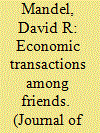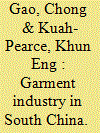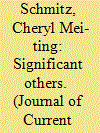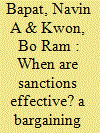|
|
|
Sort Order |
|
|
|
Items / Page
|
|
|
|
|
|
|
| Srl | Item |
| 1 |
ID:
072556


|
|
|
|
|
| Publication |
2006.
|
| Summary/Abstract |
Two experiments tested the idea that economic transactions among friends are influenced by a norm of generosity. Whereas a fairness norm ought to promote agreement in offers between buyers and sellers, a generosity norm should promote altruistic disagreements caused by sellers offering lower prices than buyers-a reversal of the well-known endowment effect. Supporting the present account, in both studies, offers among friends showed a reversal of the endowment effect. Moreover, disagreement in buying and selling offers was stronger among friends than among acquaintances, and (in study 2) the perceived generosity of offers, but not their perceived fairness, mediated this effect. Finally, both studies demonstrated that generosity is asymmetric: whereas selling offers among friends were generous by all comparative standards, buying offers were not.
|
|
|
|
|
|
|
|
|
|
|
|
|
|
|
|
| 2 |
ID:
141401


|
|
|
|
|
| Summary/Abstract |
Since the implementation of China’s economic reform and opening-up policy at the end of the 1970s, garment manufacturing for both the domestic and global markets has developed and proliferated quickly in Guangzhou-centred South China. It is believed to be the result of the industrial restructuring of the global apparel commodity chain and a large domestic consumer demand from the Chinese people. Compared with other industries, the garment industry has long been subject to the strong impact of a transitional market economy and, more recently, the increasingly rapid process of marketisation in China. In order to provide a clear sociological conceptualisation of the market economy in the reform era, this paper aims to apply the relational work approach to analysing economic transactions in the garment business, particularly business dealings between garment producers and wholesalers. The focus is on their continued efforts to make appropriate economic arrangements in accordance with specific sets of social relations through continuous relational work. This paper will examine three categories of relational work and the associated economic forms in the making. First, it will explore families and the household economy; second, it will examine relatives and friends and the favour-based economy; and third, it will study strangers and the market economy. Through the use of this relational work framework, this paper will shed light on how the different sets of relational work help us to understand relationships and embeddedness between garment producers and wholesalers in China’s rapidly evolving garment economy.
|
|
|
|
|
|
|
|
|
|
|
|
|
|
|
|
| 3 |
ID:
130284


|
|
|
|
|
| Publication |
2014.
|
| Summary/Abstract |
The sense of mystery around Chinese presences in Angola impels researchers to understand not only the empirical details of economic transactions and diplomatic partnerships but also the various ways in which the actors involved make sense of a novel social, political, and economic configuration. By drawing several ethnographic portraits of the social practices and discursive strategies at play in Chinese-Angolan relations, I show how, in a context of mutual uncertainty and suspicion, appeals to "security" play a central role. Instead of viewing Chinese and Angolans as two separate groups with opposed interests and lack of communication between them, I explore how participation in a shared context generates common modes of explanation. Moreover, I propose a parallel analysis of state-level negotiations alongside everyday social encounters to consider how a political economic partnership between China and Angola is lived through the everyday negotiations of Chinese and Angolan residents in Luanda.
|
|
|
|
|
|
|
|
|
|
|
|
|
|
|
|
| 4 |
ID:
139791


|
|
|
|
|
| Summary/Abstract |
Although a considerable literature identifies the conditions under which sanctions are more likely to be successful, few studies examine the question of when sanctioning states or senders are willing to enforce their sanctions laws against their firms. Using a game theoretic model, we argue that imposing sanctions creates a strategic dilemma for senders. We demonstrate that senders often have disincentives to enforce their sanctions policies, given that the restriction on economic transactions with targeted states may undermine their firms' competitiveness. The model indicates that sanctions are more likely to succeed when the sender's firm retains a moderate share of the target's market relative to its foreign competitors. However, the model also demonstrates that sanctions are likely to be imposed only when the conditions do not favor their success. The empirical implications of the model are tested using the Threat and Imposition of Economic Sanctions (TIES) data set.
|
|
|
|
|
|
|
|
|
|
|
|
|
|
|
|
|
|
|
|
|